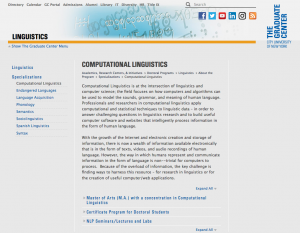Degree programs combine digital training with disciplinary learning to provide specialized skills for emerging fields of study.
Computational Linguistics M.A. program
 Master of Arts (M.A.) with a concentration in Computational Linguistics
Master of Arts (M.A.) with a concentration in Computational Linguistics
The M.A. in Computational Linguistics prepares linguistics students for challenging careers in industrial and research settings. In fact, there are many companies and research centers in the greater New York area that are focused on Internet search engine technologies, human speech recognition and synthesis, extracting and mining information available online, designing software that can analyze/process human writing, or developing educational applications. The program is designed for students with only basic familiarity with computers or programming, and the curriculum is designed to provide students with a core set of programming skills, solid foundation in major sub-‐fields of linguistics, and an understanding of modern developments in the field of computational linguistics.
Digital Humanities Track in the Master of Arts in Liberal Studies (MALS) Program
 The Masters of Arts in Liberals Studies Program (MALS) is a “unique interdisciplinary thirty-credit degree program that allows students to design and pursue an individual course of study, and to take courses in the Ph.D. programs.” The Digital Humanities track is one of its eighteen tracks. Copied below is the description for MALS 781000 – ” The Digital Humanities in Research and Teaching,” taught by Professors Matthew K. Gold and Stephen Brier:
The Masters of Arts in Liberals Studies Program (MALS) is a “unique interdisciplinary thirty-credit degree program that allows students to design and pursue an individual course of study, and to take courses in the Ph.D. programs.” The Digital Humanities track is one of its eighteen tracks. Copied below is the description for MALS 781000 – ” The Digital Humanities in Research and Teaching,” taught by Professors Matthew K. Gold and Stephen Brier:
The dramatic growth of the Digital Humanities (DH) over the past half dozen years has helped scholars re-imagine the very nature and forms of academic research and teaching across a range of scholarly disciplines, encompassing the arts, the interpretive social sciences, and traditional humanities subject areas. This course will explore the history of the digital humanities, focusing especially on the diverse pioneering projects and core texts that ground this innovative methodological and conceptual approach to scholarly inquiry and teaching. It will also emphasize ongoing debates in the digital humanities, such as the problem of defining the digital humanities, the question of whether DH has (or needs) theoretical grounding, controversies over new models of peer review for digital scholarship, issues related to collaborative labor on digital projects, and the problematic questions surrounding research involving “big data.” The course will also emphasize the ways in which DH has helped transform the nature of academic teaching and pedagogy in the contemporary university with its emphasis on collaborative, student-centered and digital learning environments and approaches. Along the way, we will discuss broad social, legal and ethical questions and concerns surrounding digital media and contemporary culture, including privacy, intellectual property, and open/public access to knowledge and scholarship. Students will be expected to participate actively in class discussions and online postings (including on blogs and wikis) and to research and write a final multimedia presentation on a key topic in the digital humanities. Students completing the course will gain broad knowledge about and understanding of the emerging role of the digital humanities across several academic disciplines and will begin to learn some of the fundamental skills used often in digital humanities projects.
The Ph.D. Program in Computer Science at The City University of New York’s Graduate Center is designed to prepare selected students for leadership in industrial and research careers – and for teaching in academia.The City University of New York (CUNY) Ph.D. Program in Computer Science is conducted as a consortium of the senior colleges within the CUNY system, as well as the Graduate Center. The Graduate Center is the only institution chartered to grant the Ph.D.. Located in mid-town Manhattan, the Graduate Center functions as the hub, both academically and administratively, of the Program. The other principal participant CUNY colleges, as of January 2011, are Brooklyn College, City College, The College of Staten Island, Hunter College, Lehman College, and Queens College.
Ph.D. courses are given at the Graduate Center – as well as seminars, special-topics classes and lectures and colloquia. Lab-oriented courses tend to be offered at the senior colleges. It is not uncommon – after the first year of study – for Ph.D. students to divide their time between the Graduate Center and one or more of the CUNY senior colleges (usually at their advisor’s home campus).
The Interactive Technology and Pedagogy Certificate program
The Interactive Technology and Pedagogy Certificate program is designed to provide intellectual opportunities and technical training that enable Graduate Center doctoral students to think creatively and critically about the uses of instructional technology to improve teaching and learning. It aims to better prepare doctoral students for life and work in the contemporary university and advances students’ skills as creators and users of technology-based educational resources. The interdisciplinary faculty and curriculum provides theoretical, historical, philosophical, literary, and sociological perspectives on technology and pedagogy and their intersection in the classroom.This site provides infomation about the curriculum and mission of the certificate program, the program’s faculty, as well as examples of syllabi and student work. The certificate program is coordinated by Dr. Stephen Brier.


